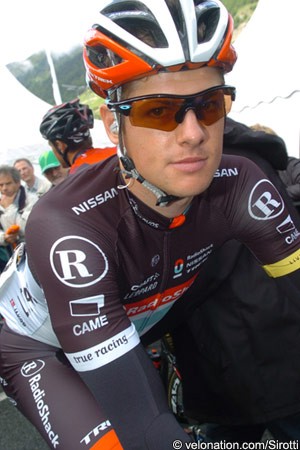UCI points system under the spotlight once again
 After voicing his disappointment with not being selected for the Tour de France and also saying that a return to Saxo Bank – Tinkoff Bank could be on the cards, Jakob Fuglsang appears to be paying the price of speaking so candidly about Team RadioShack.
After voicing his disappointment with not being selected for the Tour de France and also saying that a return to Saxo Bank – Tinkoff Bank could be on the cards, Jakob Fuglsang appears to be paying the price of speaking so candidly about Team RadioShack.
The new Danish national TT champion has told national newspaper Ekstra Bladet that he has been blocked from riding the Vuelta a España and other WorldTour races, apparently for his statements to the press and also because he could move to another team and take points with him.
“He simply will not give me the chance to score points the rest of the year,” Fuglsang said, referring to the team’s under-fire general manager Johan Bruyneel. “I asked him directly if it also means I won’t get to do the Tour of Spain, and he confirmed that.
“It is sad that RadioShack is thinking more about points than about results. Good results in World Tour races are important for the team, and World Tour points are highly important for me because they help to keep my market value. I am disappointed that I will be punished in this way.”
Under the UCI’s current – and oft criticized system – teams are given a hierarchical value depending on how many points their riders have. These points are used in part to determine of the squads are eligible for a WorldTour licence. Saxo Bank is currently last in the WorldTour standings and therefore will fare badly in the UCI’s hierarchy. While Alberto Contador will return to the team after his ban ends in early August, UCI rules also state that a rider in his position cannot contribute points to the team for a period of two years.
That effectively means that Saxo Bank Tinkoff Bank team owner Bjarne Riis needs to sign other riders with points. If Fuglsang is blocked from riding big races, it means that he has less bargaining power and could also have fewer opportunities.
Some in the sport such as AIGCP teams’ association manager Jonathan Vaughters have said that the UCI points system needs to be revised. One suggestion is that teams and riders should split points, so that a squad would retain fifty percent of what was gained even if a rider left.
Too outspoken?
As was the case before he left Saxo Bank, Fuglsang has spoken frankly in interviews. In addition to talking about his disappointment in not being selected for the Tour de France team, particularly as he missed the Giro d’Italia due to injury and then showed his form by winning the Tour of Luxembourg, Fuglsang also commented on the problems the team has experienced, including friction between Bruyneel and the Schleck brothers.
“There is more than what appears in the press,” he told Sporten.dk earlier this month. “We see only the tip of the iceberg. It does not take a genius to see that it is not running as it should.”
He now realises that talking about a possible return to Riis has made things complicated for him and is part of the reason why his calendar has been curtailed. “In retrospect it would perhaps have been smart not to comment on my situation, but where are we then?” he said. “One should be allowed to speak his mind, without having sporting consequences.”
“I’ll ride my contract out,” he resolved. “Now I will just do as well as I can in the races that I am allowed to ride.” The Tour of Austria is being suggested as his likely next event.
Ironically, Bruyneel’s own future with the team is also very uncertain. Earlier this month the Belgian was confirmed as being under investigation by USADA and could be facing serious doping charges.
Bruyneel will not work at the Tour de France as a result and, if it is proven that he was indeed involved in doping at the US Postal Service/Discovery Channel team or at any other point during his managerial career, he could be facing a lifetime ban from the sport.